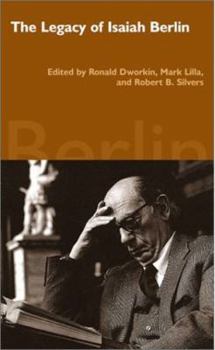The Legacy of Isaiah Berlin
Select Format
Select Condition 
Book Overview
In the fall of 1998, one year after the death of Isaiah Berlin, the New York Institute for the Humanities organized a conference to consider his intellectual legacy. The scholars who participated... This description may be from another edition of this product.
Format:Hardcover
Language:English
ISBN:0940322595
ISBN13:9780940322592
Release Date:March 2001
Publisher:New York Review of Books
Length:208 Pages
Weight:0.95 lbs.
Dimensions:9.0" x 1.0" x 5.8"
Customer Reviews
3 ratings
Writing about Isaiah Berlin is not the writing of Isaiah Berlin
Published by Thriftbooks.com User , 19 years ago
One of the distinctive elements of the writing of Isaiah Berlin is that he made intellectual history exciting for the reader. His writing has a flair, a sweep a rhythm and way of connecting the story of a thinker with his ideas which keep the reader thinking and awake. The essays here are more bland material. And even if in the consideration of Berlin's objective- value-pluralism they do raise 'hard questions' they seem far more 'academic' than Berlin himself was. As for the section on Israel and nationalism I am not sure that they underline sufficiently how devoted a Zionist Berlin was.
A Tribute to a Great Thinker and Pluralist!
Published by Thriftbooks.com User , 21 years ago
This book, which was published from a conference dedicated to discussing aspects of Berlin's emphasis on value pluralism, is divided into three sections. The first focuses on his pluralism as he saw it within history. The second takes his pluralism and speaks of it in relation to moral theory. The third discusses that pluralism as relating to the question of Israel and nationalism. Obligatory disclosure: I skipped section three as Israel is not a question that interests me, so my review is on the first two sections.Now, anyone who's read Berlin knows that he is notoriously hard to pin down. He is to historical to be a philosopher yet to philosophical to be a historian. As one who wrote more historical studies than philosophical essays (in the proper sense) Berlin's thought is hard to synthesize. This book, though, does a good service by focusing on Berlin's central theme: the plurality of values and their connection to history and philosophy. See, for Berlin, no one system could account for our moral lives. Values, ends, means, these all conflict inter- and intra-personally. No system, said he, will resolve these so that they all line up and 'hang together'. Abstractions, too, like Liberty, are meaningless without a concrete context; liberty of what according to who's view? That pluralism is what this book discusses: the first part on its affect on Berlin's historical study, the second on his philosophy. There is a great group of thinkers here: Mark Lilla, Michael Walzer, Ronald Dworkin, Thomas Nagel, Charles Taylor - on and on. The essays, more-or-less, form a consensus and largely find Berlin's pluralism unproblematic as far as its truth goes (the only article that takes issue is Dworkin's). Each thinker, though, has a different take on what accepting pluralism means and whether, if conflicting values is 'inevitable', how far we should go to TRY and reconcile them. That's where the fun is; in these small differences. I should mention to that each section ends with a 20-or-so page 'discussion' section that must have been transcribed during the seminar. We see a lot of good interchange here between the panelists. All in all, this is a book that should not be missed by those that find value (or question) in Berlinian pluralism.
Mark Lilla and Ronald Dworkin together???
Published by Thriftbooks.com User , 24 years ago
Can't wait to see this one. Lilla and Dworkin is like a collaboration between Ken Vandermark and Wynton Marsalis.






